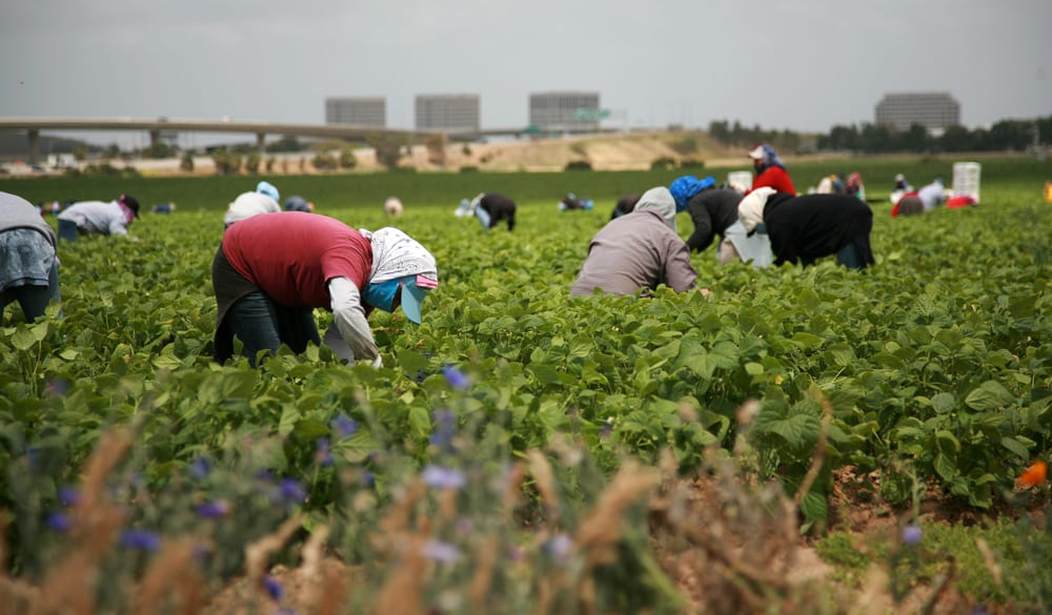It was 1967. The local music store had an ink-blue Mosrite Ventures solid body electric guitar, and I wanted it badly. Cost: $500. My family was not poor, but neither could they drop five bills on one of four children. My first guitar was a $29.99 Stella acoustic from Sears. There was only one way to get the guitar of my dreams: a summer job.
Complication: I had long hair, and even in the psychedelic sixties, few legitimate employers wanted that at their front counters or even their back rooms. All the head shop jobs were taken. We lived in Napa, California, and lucky for me a local farm was hiring plum pickers at $15 per 4X4 foot crate. I talked my buddy Dennis—another unemployable long-hair—into applying for the job with me. We were hired on the spot.
I am a border hawk. I am on record as supporting the most stringent of President Trump’s immigration proposals. In my opinion, the 1986 Simpson-Mazzoli Act (aka the Reagan Amnesty) was the biggest mistake in President Reagan’s otherwise magnificent presidency. I believe that securing the border is a ballgame issue.
However, based on my short stint as a plum picker, I know that we’re going to need some kind of seasonal agricultural work permit legislation to get the crops picked. Illegal aliens are doing most of this work now. Unless we want to pay five dollars for a head of lettuce to support $20 per hour jobs with bennies to work the fields, Americans will not do this work, and even then…
The day began with a forklift dropping off a crate at the end of a row of plum trees in a vast orchard. We were not picking these plums off the trees. Since they were destined to be processed as prunes, not grocery produce, we were picking them up off the ground. The tree-shaker had been around before dawn, and there were scores, sometimes hundreds, of fallen plums under every tree.
Since it was piecework, there was nothing to be gained by milking the clock. Dennis and I got busy. The morning hours went OK, as it was still relatively cool. We were healthy teens with a lot of energy. If we could do three crates before lunch, we would split $45; if we could equal that effort after lunch, we’d each take home $45 a day. By that equation, I’d have that Mosrite in about 10 days, at which time I intended to unceremoniously quit by not showing up.
Since we had no vehicle and the farm was on the road to Calistoga, we had to bring a lunch. A couple of times my mother drove out in our Buick Invicta wagon and brought us hamburgers, but mostly it was brought-along sandwiches (whose mayonnaise congealed in the plastic bags) and maybe a bag of Fritos. After the first day, the idea of snacking on a plum or two was unthinkable. Water was provided by a free-standing hose spigot in the field.
Bottom line, we never got those three crates after lunch. The California sun became oppressive on summer afternoons, and trees denuded of their fruit provided little shade. We lagged, lollygagged, bitched, and considered walking off the job, always picking, but at a much slower rate. By three p.m., heat prostration, if not full-on sunstroke, was a real possibility. We were sick to our stomachs, and the sight of another tree-load of warm, syrupy plums was enough to make us hurl.
The forklift came, took our full crate, and then brought another empty one. The farm boss had made clear that if we left a crate unfilled on any given day, we needn’t bother to show up for work the next day. We worked hard to fill two crates after lunch.
On about the fifth day, I noticed that our coworkers, all Hispanic, were doing things differently. By the time Dennis and I got dropped off by my mother at 8:30 a.m., they’d been on the job for hours, taking advantage of first daylight, and they rarely stuck around after two p.m. Whole families picked as a team, including young children, and they’d repeatedly blow past us in the adjoining rows, filling crates at top speed.
After a day in the orchard, my head hurt, like a delayed effect sun-fever, and the thought of going back out in the morning troubled my sleep.
Long story short, I got the guitar, but not because I stuck it out. After a week picking plums, Dennis and I had had enough, and went back to what seemed like a more productive summertime endeavor: smoking pot and chasing chicks at downtown Napa’s Fuller Park.
I’d saved a little under $200 from my time as an agricultural worker, and my parents, with what I reckon was a combination of pity and admiration for my attempt, made up the difference. Today that guitar is worth over four grand; I wish I’d kept it.
That was fifty years ago. For all our technological and mechanical advancement, the job of harvesting the products of our nation’s vast agricultural acreage hasn’t changed much since.
Yes, build the wall, enact Kate’s Law, rescind DACA, and crack down on illegal immigration. But we’re going to have to figure out a program that allows people to do a job that this American would never do again, unless I was starving.









Join the conversation as a VIP Member